Poopology!
Just when we think we've seen it all, we received a message from Erin in Indiana who requested an article on Poopology! Woo hoo! Fantastic idea! But... should we include photos... hmmm... Perhaps not...
If you want to monitor your pet duck or goose's continued health by keeping an eye on their poop, you'll need to establish a baseline first. The best way to do this is to begin with a poop test (a vet health exam is also a wise start).
When your ducklings/goslings are fully mature (6 months old), have baseline fecal tests done for each one to rule out parasites (esp. roundworms, flat worms and coccidia protozoa). If you adopt an adult duck, do the same (unless you adopt a Majestic duck, in which case, we do this for you!). Having a negative fecal result will give you an established baseline for all future poopy comparisons.
Once you have confirmed your feathered friend is healthy and parasite free, you'll find it pretty easy to keep an eye on their poo-poo because they tend to leave it everywhere... no kidding... watch your step!
Remember... Ducks and geese hide their ailments for as long as they possibly can as a natural defense against predators. By the time you notice any changes in their behavior, they are often quite seriously ill and desperately in need of urgent vet care. Any strategies you utilize to monitor those areas of their overall health that they simply cannot mask, can literally save their lives. For this reason, being a good Poopologist can help you catch problems early on.
When it comes to interpretting waterfowl doo-doo, consistency is everything--in terms of both definitions: constancy and viscosity.
Becoming a goose Poopologist is usually pretty straight forward. Since females only lay eggs every other day in the spring, and since most don't experience laying issues, their poop tends to be quite normal--same for ganders. If you're seeing changes it's time to examine factors, but more of that in just a moment.
Duck poop, on the other hand, can be very confusing. While males and retired, non-laying females tend to have far more consistent poops, they still display more variances than geese. Even more perplexing are egg-laying females, who take pooping to a whole new luxurious level.
So... This being said, when is diarrhea considered normal, and when is it abnormal? The answer: Once you have a better understanding of what is normal for YOUR particular duck or goose, you'll have a much better understanding of what is abnormal.
Once you know your pet's baseline, you'll be able to chalk some instances of watery poo-poo up to normal environmental changes (which you can then ease them through), while other instances of diarrhea may require more attention from you, or a qualified vet.
Here are some common factors that can lead to diarrhea in your pet duck or goose:
Common Causes of Diarrhea:
Diet: Have there been any changes in their diet in the last 24 hours, including new treats, too many treats? Or have they gotten into something they shouldn't have? Look around carefully.
The old, "My goose ate too much watermelon" pink poop can be a shocker the first time you see it. Same goes for the standard, "My duck ate too much lettuce" shocking, dark green poop.
REMEDY: Treat colored poo is fine if the consistency is normal, but if you're seeing funny-colored diarrhea, you may have been a little too generous at treat time. Avoid or decrease amounts and/or frequency of treats given in order to achieve normalcy. Ducks and geese usually don't experience issues while changing feed brands or formulas, but if you do see trouble, definately do some mixing as you work to switch them over at a slower pace.
IT'S TIME TO CALL YOUR VET WHEN: If the diarrhea does not clear up within 24-48 hours, is excessive, or especially watery in consistency, it's time to call your vet right away. WATCH CLOSELY... for any signs of accidental poisoning and call your vet immediately if you see any other symptoms, or if their health begins to decline at all.
Molting: Is your duck or goose entering or amidst a period of feather shedding or re-growth (this includes both full and partial molts)?
REMEDY: A good avian probiotic can help and is easy to sprinkle over their food every day (we use Avi-Culture-2-Plus, which stores in the freezer for years). You can also ask your vet about a quality multivitamin (we use Vionate). Any temporary bouts of diarrhea should fade out when the cycle of re-growth is complete.
IT'S TIME TO CALL YOUR VET WHEN: It's very rare for the diarrhea to appear consistently throughout these weeks of molting. If you're seeing consistent diahrrea for more than 2 days, or if their diarrhea is excessive, or especially watery in consistency, or if they are displaying any other symptoms, it's time to call your vet immediately.
Temperature: Has their been a drastic change in temperature (esp. approaching ten degrees or more) in the last 24 hours?
Sometimes rapid temperature changes happen in nature; other times, they are brought on by humans. Whenever there is a rapid change in temperature taking place within a short peroid of time, your pet's immune system can be put at risk.
REMEDY: Be mindful of temperatures and upcoming forecasts. Avoid moving pet ducks or geese from indoor situations to outdoor environments (or vice versa) whenever there is a notable variance in temperature or humidity. All transitions should be handled slowly, giving pets time to adapt.
IT'S TIME TO CALL YOUR VET WHEN: If the diarrhea does not clear up within 24 hours, or if it is excessive, or especially watery in consistency, or if they are displaying any other syptoms, you should consult with your vet immediately.
Water Intake: Has your duck been drinking a lot lately? This could be caused by increased heat or aridness in the air. It could also be caused by compromised renal function. Lots of water going in leads to lots of water coming out and this can lead to... diarrhea.
REMEDY: As with temperature, be mindful of upcoming changes in the forecast. Be sure to provide plenty of shady areas and keep COLD water continually available on hot/dry days. You want your duck or goose to be able to cool down effectively. Hot sun and warm water can lead to increased fluid intake, which can lead to diarrhea.
IT'S TIME TO CALL YOUR VET WHEN: If the diarrhea does not clear up within 24-48 hours, or if their diarrhea is excessive, or especially watery in consistency, or if they are displaying any other symptoms, you should consult with your vet right away. URGENT... If their excessive drinking does NOT directly correlate with noticeable weather changes (increased temperatures/reduced humidity), call your vet immediately to check their renal function and other vitals.
Egg-Layers: Egg-laying ducks have the most varied poop of all, with diarrhea being quite common. Diarrhea can occur even when your duck (or goose) is seemingly on a break from laying as their body adjusts from seasonal stops or starts.
The most infamous type of egg-laying diarrhea is the always funny, "My duck held in their poop while on the nest and then got off the nest and nearly split the heavens in half with their stinky poop explosion." No kidding. Crazy, nasty stuff. PU!
Worst case scenario aside, ALL egg-layers can have ALL kinds of watery-to-firm poop. It just depends on their own inherited digestive system, combined with where they are in their laying cycle when they have to go doo-doo.
REMEDY: Aside from a very healthy, high-quality, brand-named laying formula diet that includes oyster shells (and sometimes avian probiotics), there really isn't a remedy for this one. Even so, give your females a nice nesting place to lay their eggs. Try to schedule their morning routine around their egg-laying whenever you can, so you're not disturbing them, or asking them to move, eat treats, swim, etc. when they are otherwise engaged.
IT'S TIME TO CALL YOUR VET WHEN: This is a case where it pays to know your duck or goose's normal poopy from their abnormal. Some ducks have frequent intervals of diarrhea, others not so much. If your duck is experiencing frequent symptoms it's probably a good idea to have a cloaca bacterial swab or blood work done by your vet to confirm she's in good health. If everything checks out, you'll have a firm baseline going forward. From here, you know your job is to watch for symptoms over and above these bouts as an indicator that something might be wrong. If your duck or goose's diarrhea is unusual or excessive in comparison to their own normal baseline, or if they are displaying any other symptoms, you should consult with your vet right immediately.
Stress: Dietary changes, the onset of molting, temperature variances, increased drinking and egg-laying are all examples of stressors--and these are NOT the only ones. If you're seeing diarrhea (outside of your duck or goose's normal baseline) and the answer is not in the above list, look around for other disturbances that you may be taking for granted, but that your pet is not. These can include newly introduced pen mates, spring fever (increased mating hormones), daylight changes, loud noises to the area, a new predator coming through (and one you may not know about), new people visiting your home, new objects in their pen... the list goes on-and-on and it can be different for everyone.
REMEDY: Try to determine the nature of the problem and then eliminate it if you can, or find ways to offer comfort to your pet duck or goose if it's something you cannot remove. For instance, a new pen feature may stress out your feathered friend; if so, offer up their favorite things (treats and snuggles, perhaps?!) and then give them time to get used to the change. Try not to force them to accept changes if you can ease them through them instead.
IT'S TIME TO CALL A VET WHEN: If you cannot pinpoint the stressor and the diarrhea does not clear up within 24-48 hours, is excessive, or especially watery in consistency or if they are displaying any other symptoms, it's time to call your vet immediately.
More Serious Causes of Diarrhea:
Parasites, pnemonia, fever, poisoning, bacterial infection, viral infection, failing organs and basically all other forms of illness and disease can lead to the onset of diarrhea. This is why it's so important to know your pet's baseline and call your vet right away if you're witnessing something outside of their normal--and outside of anything explicable.
Who Done It?
If you have multiple ducks or geese in your flock, you may need to seperate them (temporary playpen fences work great) in order to figure out who is leaving which pile of doo-doo. That, or you can bring out a chair and sit and watch for a while. Once you successfully determine who's having trouble you can set down a small tarp, or bring them to a better place that will enable you to collect a sufficient sample of these watery poopies for your vet to see and possibly, test.
White Swirls in The Poop
Sometimes too much white swirling through the poo can be indicative of a problem, including (but not limited to) a bacterial or viral infection, or even parasites (espeically coccidia). However, this is not always the case. Some egg-layers just have a lot of white swirls in their poo, as do stressed ducks and geese, or birds whose diets are a little too varied (which might mean you need to even things out a bit). We see a lot of white swirl in our new rescues who tend to be malnourished and stressed. A lot of white swirl can also just be your duck or goose's normal; in which case, your job is to notice any marked changes from their particular baseline.
Signs of Danger in The Poop
Some things seen in poop, do NOT belong there; and if you see them, you need to call your vet immediately. These include: egg remnants (whites, yolks or soft shells), yellow discharge, yellowy clumpy droppings, discharge resembling cottage cheese, blood, swallowed foreign objects or anything else out of the ordinary for your pet duck or goose.
Also watch for bright green (almost flourescent)/yellowy-green poop, which is often a sign of hardware disease and/or lead poisoning. In which case, you will also need to call your vet right away.
Accompanying Symptoms
While any other accompanying symptoms to your duck or goose's diarrhea should be noted and immediately acted upon (by calling your vet), remember to check those areas that are difficult to see; that is, their booty.
Your pet duck or goose may not like it, but it's a good idea to check out their vent. Take a quick look and make sure it isn't swollen, infected, off-color, or bloody while also making sure that their oviduct or penis is properly tucked away. If you spot an issue, you know what to do: Call your vet immediately.
Fun Fundraising Items!
Kim has been working on some AMAZING waterfowl goodies & games, which she plans to sell to raise sanctuary funds while also spreading around some ducky joy!
Twirling Duck Music Box with Rainbow light-up Fairy Castle:
Found in a vintage store, this dull ballerina music box has been transformed into a colorful treasure trove of hidden goodies! It includes a fairy village that spills from inside the box, outside to the front porch. Ducky ballerina really spins!
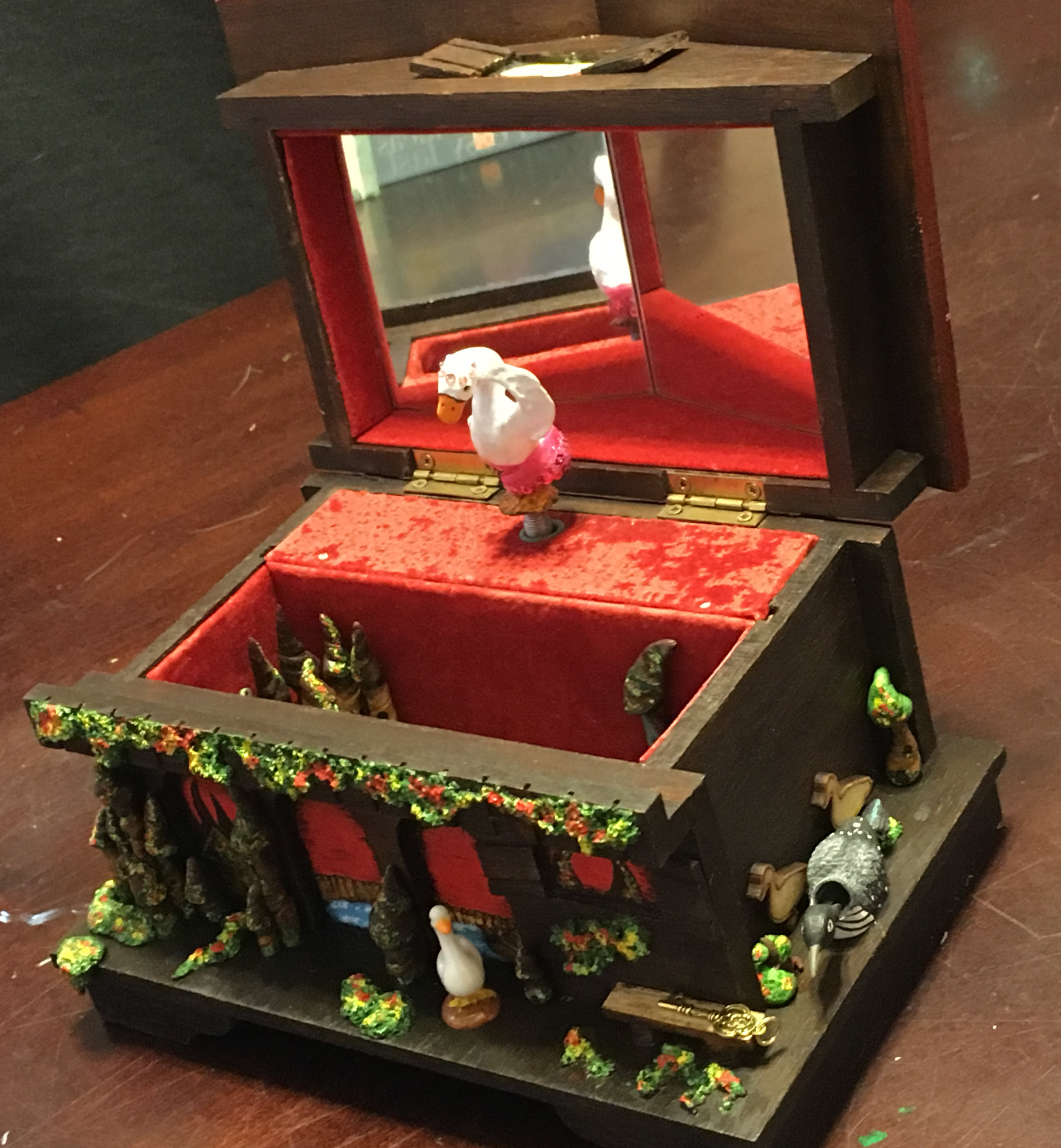 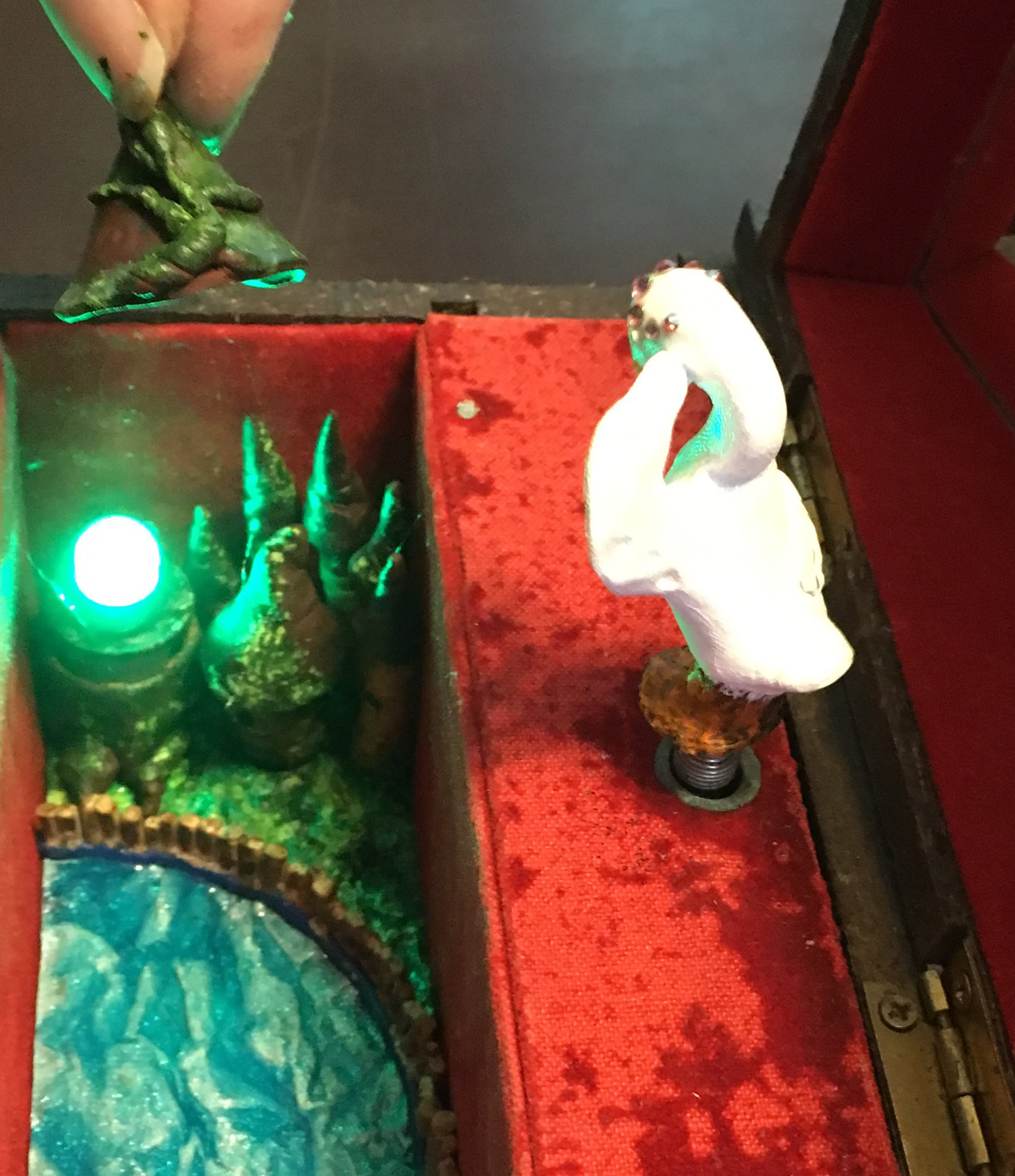
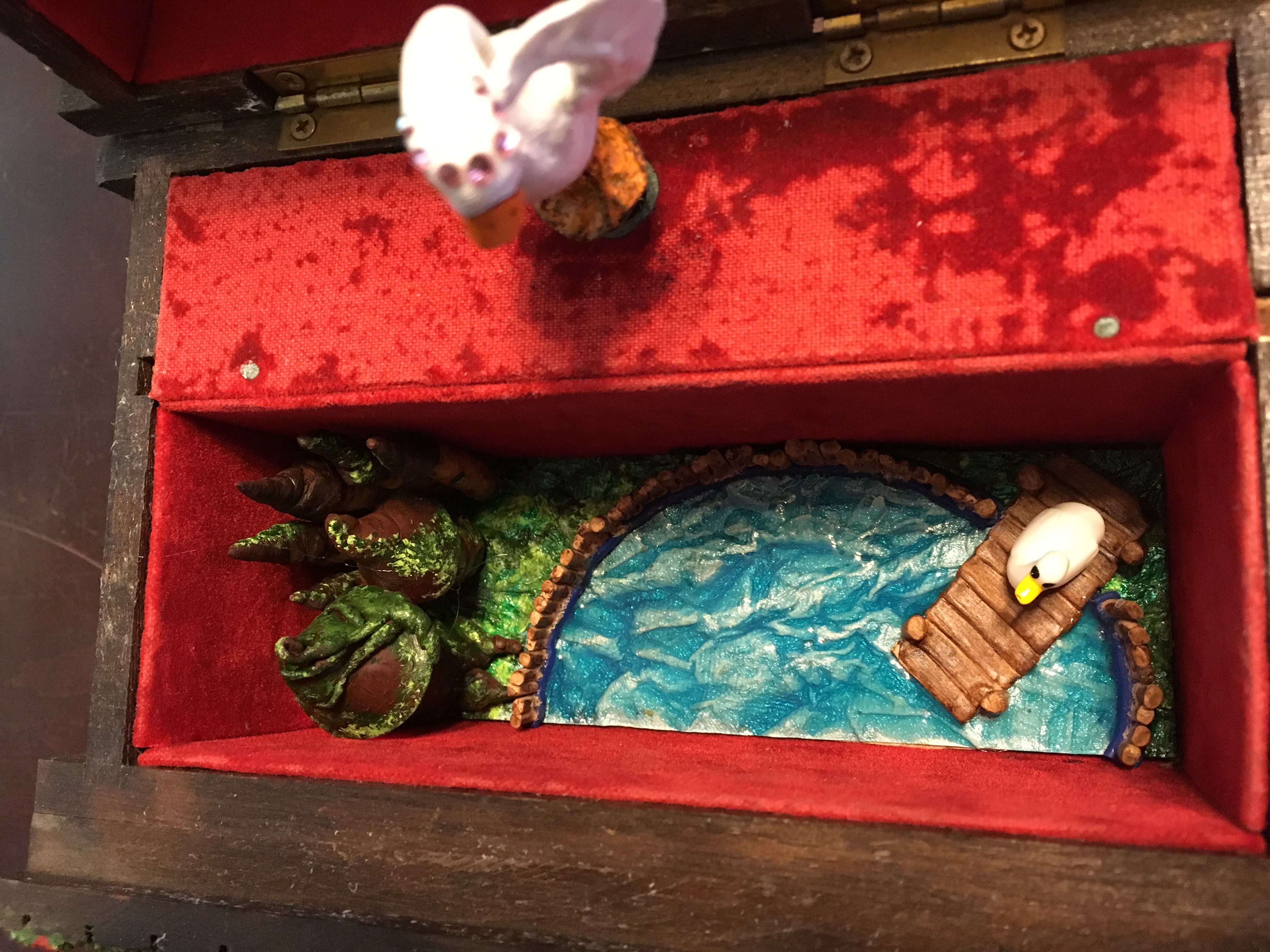
Tiny Ducks inside the Ark:
Kim took this little treasure and added to itsy-bitsy ducks inside. Opens and closes!
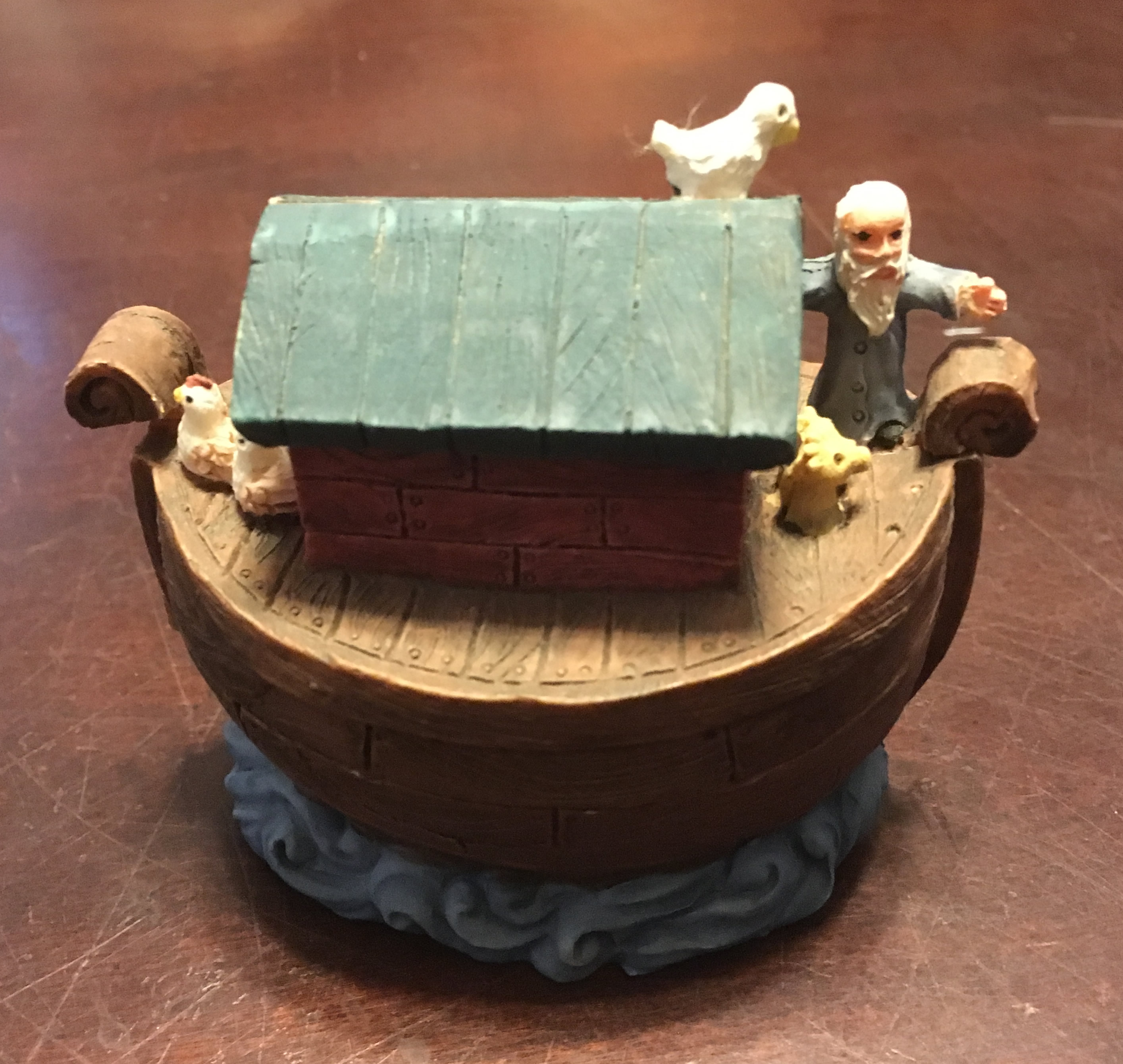 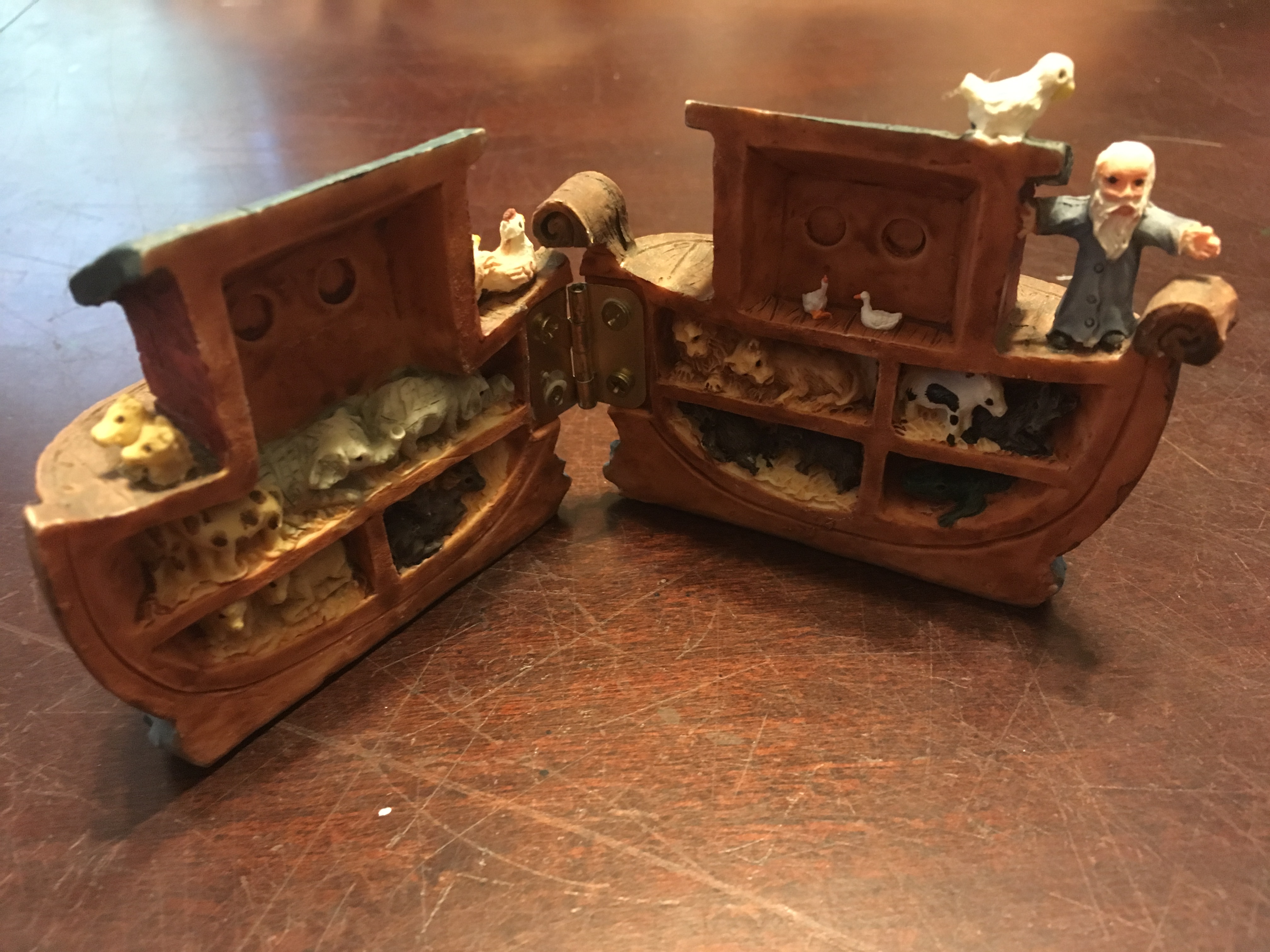
Ducky Rides & Slides Game:
Kim's custom Drinking Duck Sorry game was such a huge hit, she decided to make her own ducky version of Chutes & Ladders next!
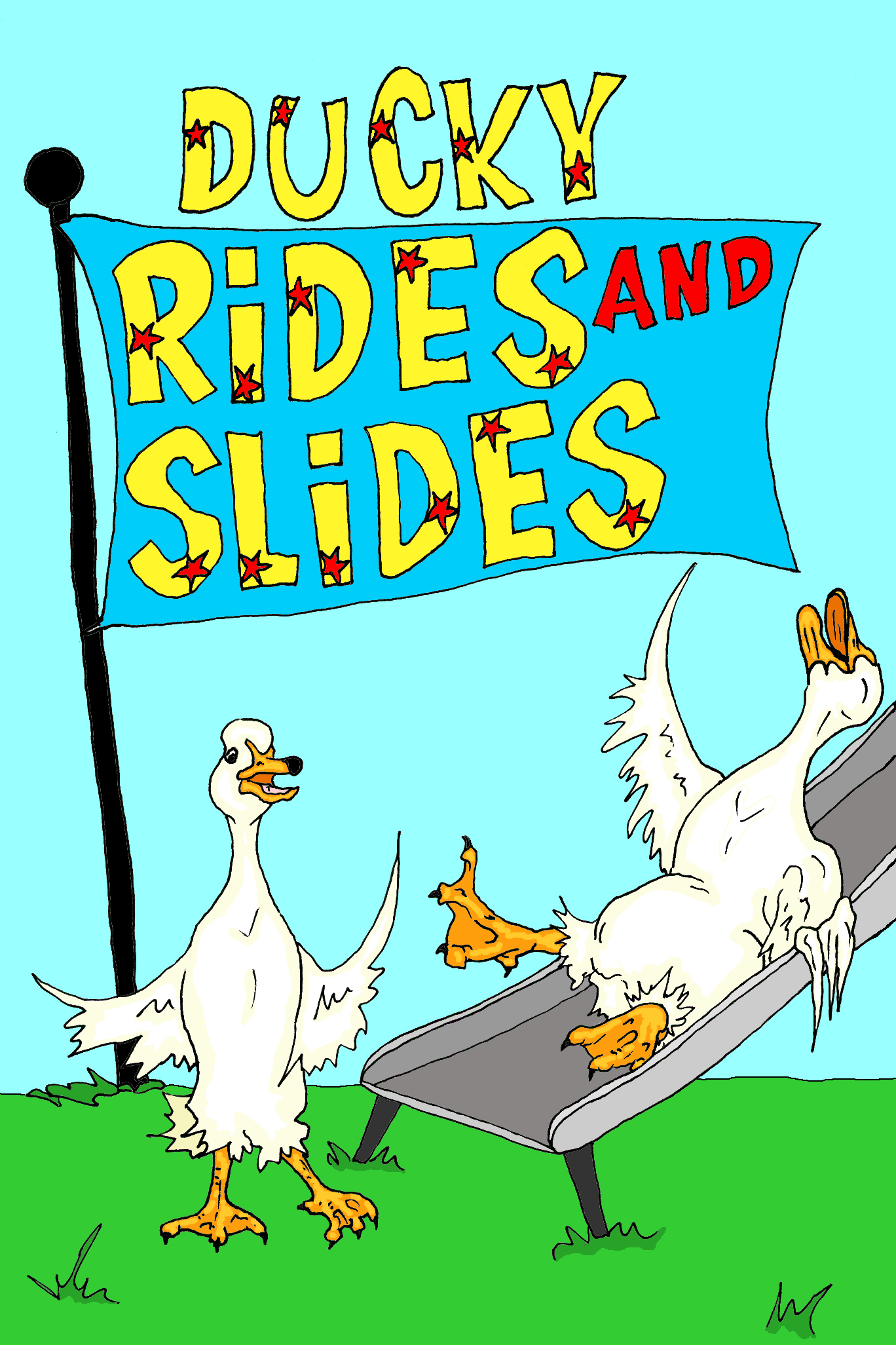
When assembled, this two-piece 3D tabletop, gameboard measures 48" x 48" and comes with 4 duck pawns, 4 corresponding dice, an instruction booklet, a mounted wooden rope ferry that moves and an orange boat for your duck to ride down the slide!
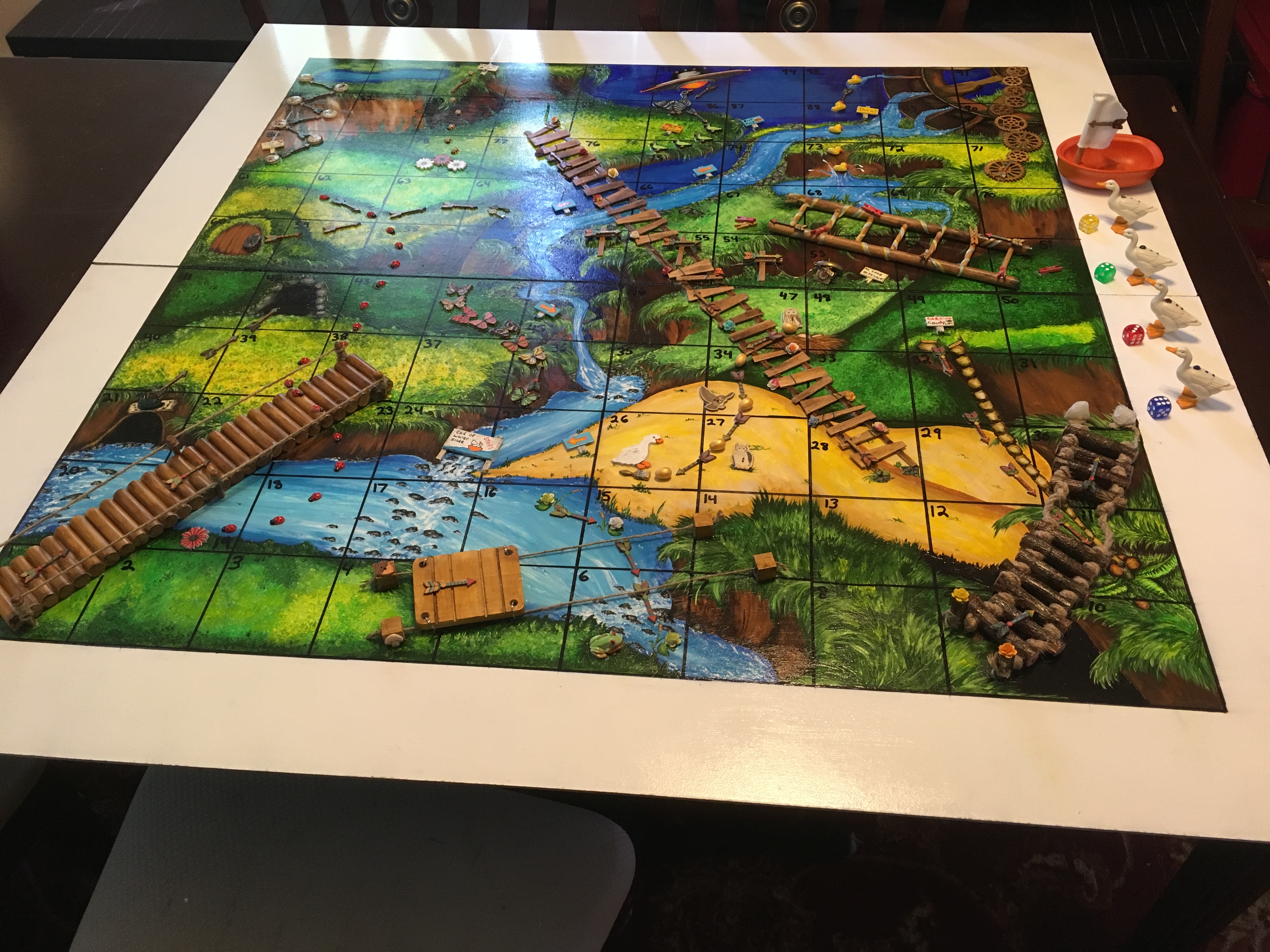
Stay Tuned on our Instagram and Facebook pages for updated information on how you can donate for a chance at these and other Quack-tastic items!
For The Birds
Now available on itunes and coming soon to AmazonSmile, For The Birds is now available for home viewing.
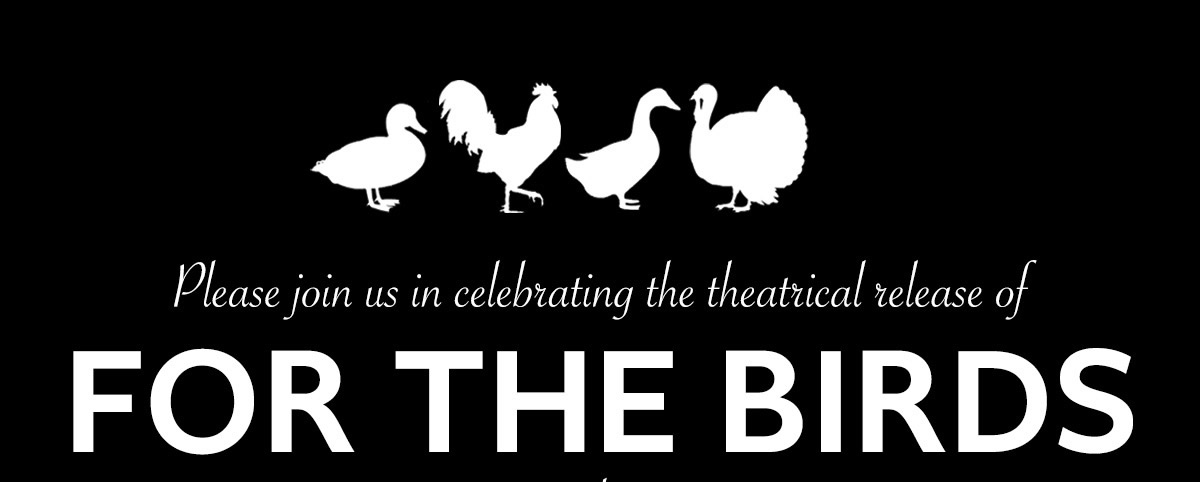
|

